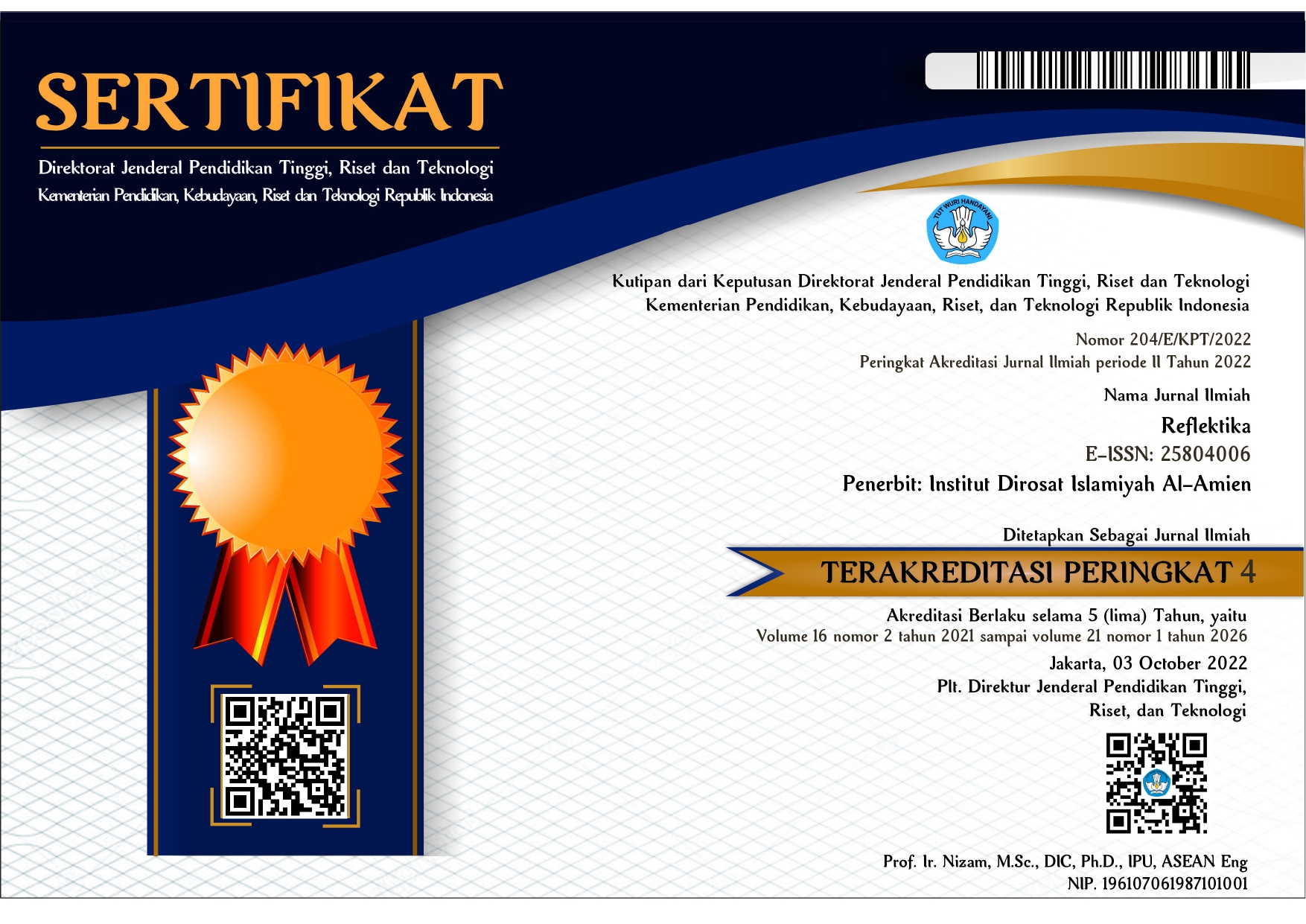STUDI TENTANG PELEMBAGAAN SUBSTANSI BUDAYA ORGANISASI DALAM KONSEP LEARNING ORGANIZATION
Abstract
The educational agenda's long-term viability and suitability for institutional revitalization efforts are still being debated. To address the issue of educational institutions, a new conceptual framework model is required. The concept of organizational development via the concept of learning organization is already numerous and well-established. As a result, the study seeks to understand the governance model of long-term learner organizations that have been thoroughly examined in terms of organizational culture. The descriptive survey method was used for qualitative research. The study's findings revealed five essentials in the implementation of the learner school concept, namely the creation of an educational environment, the enhancement of institutional independence, the succession of learner leadership, and the caderization program as evidence of the institution's sustainability guarantee. Several school programs, including extracurricular activities, school literacy movements, habitation activities, and spontaneous behavior, reflect the cultural actualization of organizations. Managers' commitment to education is recommended by the study's findings in order to remain sustainable; community participation is optimized, with a focus on aspects of data inventory, planning, implementation, monitoring, and evaluation of programs, and optimization of community participation by being supported by Local Governments, including stakeholders. The practical implications of learner concepts create broader and more transformative cultural values that reflect the 21st century's complex challenges and the need for structural reform in sustainable organizations.
Keywords
References
Akram, Muhammad, and Ashfaque Ahmad Shah. “Predicting Student Achievement through Organizational Learning Culture.†Journal of Education and Social Sciences 6, no. 2 (2018): 15–26.
Ashkanasy, Neal M., Celeste P. M. Wilderom, and Mark F. Peterson. Handbook of Organizational Culture 7 Climate. California: Sage Publication, 2010.
Askell-Williams, Helen, and Gloria A. Koh. “Enhancing the Sustainability of School Improvement Initiatives.†School Effectiveness and School Improvement 31, no. 4 (October 1, 2020): 660–78. https://doi.org/10.1080/09243453.2020.1767657.
Bjork, Christopher. “Decentralisation In Education, Institutional Culture And Teacher Autonomy In Indonesia.†International Review of Education/ Internationale Zeitschrift Fr Erziehungswissenschaft/ Revue Inter 50, no. 3 (July 2004): 245–63. https://doi.org/10.1007/s11159-004-2622-6.
Costantini, Valeria, and Salvatore Monni. “Sustainable Human Development for European Countries.†Journal of Human Development 6, no. 3 (November 2005): 329–51. https://doi.org/10.1080/14649880500287654.
Doppelt, Bob, and William McDonough. Leading Change Toward Sustainability. Routledge, 2017. https://doi.org/10.4324/9781351278966.
Fauzi, Ahmad, and Mauloeddin Afna. “Sustainability Ummat: Geliat Pesantren Dalam Membangun Kemandirian Ekonomi Masyarakat Aceh.†At-Tafkir 9, no. 2 (2016): 84–121.
Fullan, Michael. Leadership & Sustainability. System Thinkers in Action. Thousand Oaks: Corwin Publisher, 2012.
Gogoi, Sampreety. “Life Skill Education in School for Sustainable Human Development.†Advance Research Journal of Social Science 9 (2018): 114–18. https://doi.org/10.15740/HAS/ARJSS/9.1/114-118.
Harris, Mary M, and Frances van Tassell. “The Professional Development School as Learning Organization.†European Journal of Teacher Education 28, no. 2 (June 2005): 179–94. https://doi.org/10.1080/02619760500093255.
Huberman, Michael, and Matthew B Miles. The Qualitative Researcher’s Companion. Sage, 2002.
Iyer-Raniga, Usha. Sustainability in the Built Environment in the 21st Century: Lessons Learned from India and the Region. Springer Nature, 2021.
J. Hogan, Suellen, and Leonard V.Coote. “Organizational Culture, Innovation, and Performance: A Test of Schein’s Model.†Journal of Business Research 67, no. 8 (2014): 1609–21. https://doi.org/10.1016/j.jbusres.2013.09.007.
Kaur, Navneet, and Navleen Kaur. “Life Skills Education for Human Resource and Sustainable Development.†International Journal of Education and Management Studies 7, no. 4 (2017): 558–60.
Kondalkar, V. G. Organizational Behaviour. 1st ed. New Delhi: New Age Publisher, 2007.
Kools, Marco, and Bert George. “Debate: The Learning Organization - a Key Construct Linking Strategic Planning and Strategic Management.†Public Money & Management 40, no. 4 (May 18, 2020): 262–64. https://doi.org/10.1080/09540962.2020.1727112.
Kristiansen, Stein. “Decentralising Education in Indonesia.†International Journal of Educational Development 26, no. 5 (2006): 513–31.
Lewis, Steven, Glenn C. Savage, and Jessica Holloway. “Standards Without Standardisation? Assembling Standards-Based Reforms in Australian and US Schooling.†Journal of Education Policy 35, no. 6 (November 1, 2020): 737–64. https://doi.org/10.1080/02680939.2019.1636140.
Lin, Kuan, Joseph Shyu, and Kun Ding. “A Cross-Strait Comparison of Innovation Policy under Industry 4.0 and Sustainability Development Transition.†Sustainability 9, no. 5 (May 9, 2017): 786. https://doi.org/10.3390/su9050786.
Mandy, Singer-Brodowski. “Pedagogical Content Knowledge of Sustainability: A Missing Piece in the Puzzle of Professional Development of Educators in Higher Education for Sustainable Development.†International Journal of Sustainability in Higher Education 18, no. 6 (January 1, 2017): 841–56. https://doi.org/10.1108/IJSHE-02-2016-0035.
Marthunis, Marthunis. “Learning Organization Membangun Komunitas Pembelajar Di Sekolah: Pengalaman Sekolah Sukma Bangsa.†Sukma: Jurnal Pendidikan 4, no. 2 (2020): 135–60.
McFarlane, Donovan A, and Agueda G Ogazon. “The Challenges of Sustainability Education.†Journal of Multidisciplinary Research (1947-2900) 3, no. 3 (2011).
Mujib, Ibnu, Irwan Abdullah, and Heru Nugroho. “Islam in The Global Village: Post-Tsunami Dialog and Negotiation of Aceh Identity.†AL ALBAB - Borneo Journal of Religious Studies (BJRS) 2, no. 2 (2013): 221–36.
Nambissan, Geetha B. “The Global Eeconomic Crisis, Poverty and Education: A Perspective from India.†Journal of Education Policy 25, no. 6 (November 2010): 729–37. https://doi.org/10.1080/02680939.2010.508180.
Oktari, Rina Suryani, Koichi Shiwaku, Khairul Munadi, Syamsidik, and Rajib Shaw. “A Conceptual Model of a School–Community Collaborative Network in Enhancing Coastal Community Resilience in Banda Aceh, Indonesia.†International Journal of Disaster Risk Reduction 12 (June 2015): 300–310. https://doi.org/10.1016/j.ijdrr.2015.02.006.
Radd, Sharon I., Tanetha J. Grosland, and Amanda G. Steepleton. “Desegregation Policy as Cultural Routine: A Critical Examination of the Minnesota Desegregation Rule.†Journal of Education Policy 35, no. 6 (November 1, 2020): 765–84. https://doi.org/10.1080/02680939.2019.1609092.
Robert, Kates W, Thomas M Parris, and Anthony A Leiserowitz. “What Is Sustainable Development? Goals, Indicators, Values, and Practice.†Environment: Science and Policy for Sustainable Development 47, no. 3 (2005): 8–21.
Sange, Peter. Fifth Discipline, Currency Dobleday. New York: Pearson, 1990.
Scheerens, Jaap. “School, Teaching, and System Effectiveness: Some Comments on Three State-of-the-Art Reviews.†School Effectiveness and School Improvement 25, no. 2 (April 3, 2014): 282–90. https://doi.org/10.1080/09243453.2014.885453.
Schein, Edgard H. Organizational Culture and Leadership. Third Edit. San Francisco: Jossey Bass, 2010.
Seghezzo, Lucas. “The Five Dimensions of Sustainability.†Environmental Politics 18, no. 4 (July 24, 2009): 539–56. https://doi.org/10.1080/09644010903063669.
Sellar, Sam, and Bob Lingard. “The OECD and Global Governance in Education.†Journal of Education Policy 28, no. 5 (September 2013): 710–25. https://doi.org/10.1080/02680939.2013.779791.
Shahjahan, Riyad A. “On ‘Being for Others’: Time and Shame in the Neoliberal Academy.†Journal of Education Policy 35, no. 6 (2020): 785–811.
DOI: 10.28944/reflektika.v17i1.573
Refbacks
- There are currently no refbacks.


.png)

